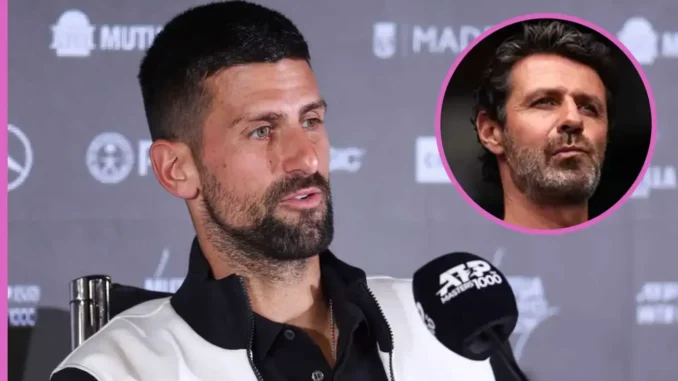
As the tennis world gears up for the 2025 Wimbledon Championships, set to begin on June 30, a storm of debate has swirled around Novak Djokovic, the 24-time Grand Slam champion, and his pursuit of a record-equaling eighth Wimbledon title. Renowned coach Patrick Mouratoglou, currently mentoring Naomi Osaka, sparked controversy with recent comments questioning Djokovic’s motivation following his semi-final loss to Jannik Sinner at the French Open. In a clarifying statement, Mouratoglou has elaborated on his perspective, emphasizing that his remarks were not meant to dismiss Djokovic’s drive but to highlight the mental challenges facing the Serbian legend as he chases a historic 25th Grand Slam.
Mouratoglou’s initial comments, shared on social media, sent shockwaves through Djokovic’s passionate fanbase. Reflecting on the straight-sets defeat to Sinner (6-4, 7-5, 7-6), he observed, “I felt he did accept a little bit too much the dominance of Sinner on him, which is not Novak. I didn’t see the Novak I know, and I still think his motivation is not high enough.” He noted a shift in Djokovic’s demeanor, pointing out, “His body language was different. He was smiling at his team, enjoying the moment—that’s not Novak. He’s a fighter.” These remarks suggested that Djokovic, typically a relentless competitor, appeared to lack the fierce intensity that defined his battles against rivals Roger Federer and Rafael Nadal. “It’s not about the tennis, it’s more about the mental side of it,” Mouratoglou added, drawing parallels to his time coaching Serena Williams, who faced similar motivational hurdles after achieving historic milestones.
The backlash was swift, with fans defending Djokovic’s competitive spirit, especially after his Olympic gold medal triumph in 2024, where he displayed ferocious determination against Carlos Alcaraz. Responding to the uproar, Mouratoglou took to LinkedIn to clarify his stance. “It is there [motivation], but I don’t know exactly where it is,” he wrote, acknowledging that Djokovic’s drive remains but may lack the singular focus that once fueled his quest to surpass Federer and Nadal. “The Novak who once played with rage and purpose was driven by a fight, not just to win Grand Slams, but to be the greatest of all time. That fight is over. He won it. Now the question is: what’s next?” Mouratoglou’s clarification underscores the psychological shift for a player who has achieved unparalleled success, tying Margaret Court’s record of 24 Grand Slams and dominating the ATP Tour for over two decades.
Djokovic’s 2025 season has been a mixed bag, with a semi-final run at the Australian Open and a final at the Miami Open, but no titles since his 2023 Tour Finals victory. His clay-court campaign was particularly rocky, with early exits in Monte Carlo and Madrid, prompting Mouratoglou to question his preparation. “He just didn’t look like he wanted to win. He didn’t even look like he cared to win,” he said of Djokovic’s Madrid loss to Matteo Arnaldi. Yet, Djokovic’s decision to compete in the ATP 250 Geneva Open and his resilience against Alexander Zverev at Roland Garros suggest he’s still searching for form. Mouratoglou believes the key lies in rediscovering purpose, noting, “When you’ve climbed the mountain, what pushes you to climb it again?”
With Andy Murray now in Djokovic’s coaching box, Mouratoglou expressed cautious optimism about the partnership. “Is Murray the right person to motivate him? Yes and no,” he said, praising Murray’s strategic insight but questioning whether he can reignite Djokovic’s fire. As Wimbledon approaches, the tennis world watches closely. Can Djokovic, at 38, summon the mental fortitude to conquer emerging stars like Sinner and Alcaraz? Mouratoglou’s comments frame this as a pivotal moment in Djokovic’s legacy, where motivation, not skill, will determine his path to greatness.
Leave a Reply